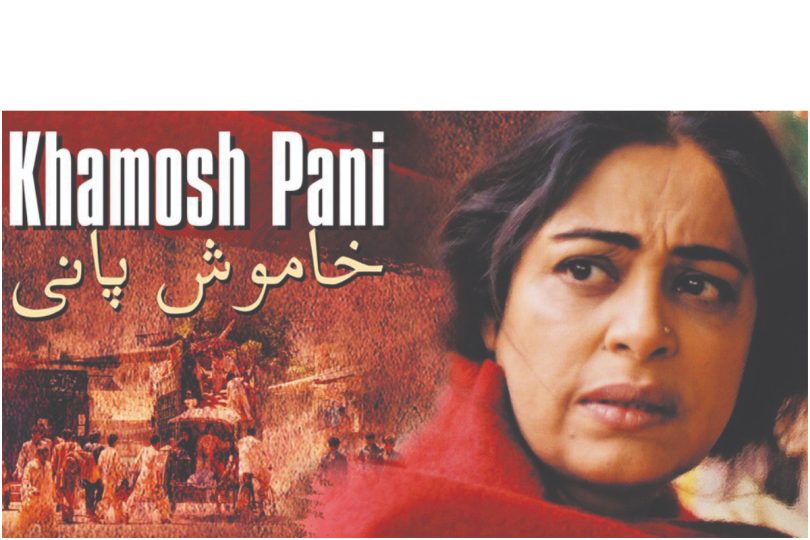After 20 years, Sabiha Sumar’s Khamosh Pani was finally released in Karachi
The cinema of the Indian subcontinent is mostly known throughout the world for its song and dance routine but once in a while comes a film that changes the views of the West with its powerful storytelling and impressive execution. In India, such films are welcomed with open arms whereas in Pakistan they aren’t allowed to be released because of various reasons. Khamosh Pani was one such film that wasn’t given the NOC to be screened way back in 2003 and the makers had to be content with festival screenings as well as foreign releases, until 2023 when the film was finally screened the way it was meant to be, in a movie theatre.
The Plot
The story is set in 1979, in a village named Charkhi in the Pakistani Punjab where people from all walks of life reside peacefully. Their lives are turned upside down when two government-backed extremists (Sarfaraz Ansari and Adnan Shah Tipu) arrive from the city to recruit youngsters to fight in the Afghan war, and under the guise of teaching their version of Islam, they disturb the peace in the area. That’s when Saleem (Aamir Malik) loses interest in his girlfriend Zubeida (Shilpa Shukla), which sort of makes his mother Ayesha (Kirron Kher) suspicious, who then confronts her son for falling for the wrong version of Islam. However, when one of the Sikh pilgrims reaches Ayesha’s doorstep while searching for her long-lost sister, things go from bad to worse for Ayesha, who is boycotted by all, including her acquaintances (Arshad Mahmud, Fareeha Jabeen, Salman Shahid, Abid Ali) for hiding her past.

The Good
Khamosh Pani is the perfect representation of Pakistan under military dictator Zia ul Haq where you were either pro-Zia or anti-Zia. It revolves around the lives of these two kinds of people in a remote village, where once religion is used as a tool by extremists, things begin to go awry. The locals who stand against the extremist side of the religion are bullied by those backed by the establishment while women are treated with disrespect, something that’s visible from the scene where their school wall is extended so that passersby aren’t able to take a sneak peek inside.
And if that’s not enough, the way Kirron Kher and Aamir Malik portray their characters is nothing short of award-worthy because due to their anonymity, they were able to pass as their characters, and not as themselves. At the beginning of the film, they had a great chemistry that became toxic by the time the film reaches its completion, which is impressive as well as commendable. The way the director has incorporated VCRs, TV, religious pamphlets, sermons, and the need for a beard makes you hate the era more than you already do.
Renowned TV actors late Abid Ali, Arshad Mahmud, Salman Shahid, Fariha Jabeen, Nisar Qadri, and Rehan Sheikh also make their appearances in the film and without their mention, the review would have been incomplete. Arshad Mahmud not only sang a song with Begum Khursheed Shahid (Salman Shahid’s mother) but was partly responsible for the background score. From the very first frame till the last the narrative was gripping and doesn’t let the audience’s attention waver, and the team behind the making must be commended for that.
The Bad
There is hardly anything wrong with Khamosh Pani except the fact that at times it looks dragged. Maybe that has more to do with the original cut being twenty years old when the storytelling style was different. Other than that, everything from the art direction to the characterization is executed perfectly. Although Shilpa Shukla (of Chak De India, BA Pass fame) made her debut in the film, she somehow looks more Indian than the rest of the primarily Pakistani cast.
The Verdict 4/5
Better late than never is the best way to describe the screening of Khamosh Pani in NAPA last weekend. It was screened in Karachi once before during the now-defunct KARA Film Festival but that was for a selected audience. Thanks to the latest screening that was attended by some of the cast members, more people were able to watch it this time and were pleasantly shocked by what they witnessed. They finally saw the movie which for twenty years remained a benchmark for others to follow and got to witness the reasons why it became the first Pakistani film to achieve international fame and recognition.
Today, Khamosh Pani is celebrated internationally as a modern classic and was rereleased in Europe on the 70th anniversary of the partition of the Indian subcontinent. Not only was it awarded the highest prize at Locarno Film Festival – the Golden Leopard – it also won the highest international award for at that time relatively lesser-known Indian actress Kirron Kher who played the central character. Also, it was the first South Asian film to enter Sundance Film Festival and even won a theatrical release worldwide including in the Indian cities of Mumbai and Delhi where it ran parallel to Yash Chopra’s Veer Zara for more than two months.
Viewing it today will make the audience feel that by not releasing it in cinemas in 2002, the military establishment of the time erred massively. Films like these need to be viewed in cinemas, and not on other platforms, and had it been given permission to screen, who knew that it might have ended up winning an Oscar for the country.







